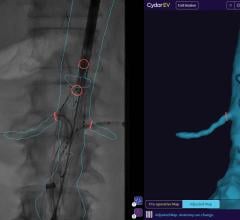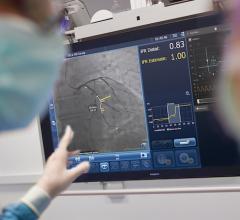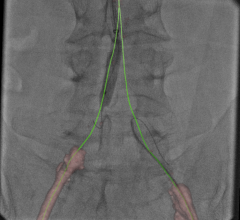
January 27, 2011 – The U.S. Food and Drug Administration (FDA) granted conditional investigational device exemption (IDE) approval to evaluate the safety and effectiveness of a cath lab robotic navigation system to direct guidewires and place coronary stents.
The CorPath 200 system is designed to deliver and manipulate coronary guidewires and stent/balloon systems in percutaneous coronary interventions (PCI). With this approval, Corindus Vascular Robotics is authorized to begin its pivotal trial, CorPath PRECISE. The trial is a prospective, single-arm, multi-center, study, which will initially enroll 154 patients at leading medical centers across the United States, including Columbia University Medical Center in New York, St. Elizabeth’s Medical Center in Boston, Virginia Commonwealth University Medical Center in Richmond, Va., and St. Joseph’s Hospital Health Center in Syracuse, New York.
“Interventional cardiologists perform hundreds of PCI procedures each year,” said Giora Weisz M.D., co-principal investigator, assistant professor, Columbia University College of Physicians and Surgeons, New York. “By utilizing the CorPath System, we hope to demonstrate both precision and accuracy of robotically-assisted PCI procedures.”
PCI is performed by an interventional cardiologist in a catheterization laboratory (cath lab) utilizing X-ray angiography imaging. Interventional cardiologist’s daily exposure to radiation and the physical stresses inherent in the cath lab can lead to occupational health risks — including orthopedic problems, cataracts and cancer, according to recent data published in Catheterization and Cardiovascular Intervention journal.
The CorPath 200 system allows for controlled robotic-assisted placement of coronary guidewires and stent/balloon catheters from an ergonomically optimized interventional cockpit. The lead-lined cockpit protects the operator from radiation exposure. The comfortable seated position in front of the monitors provides enhanced visualization of the angiography screen while reducing fatigue and minimizes head, neck and back strain.
While the clinical endpoint of the trial is the ability to treat the patient without the incidence of major adverse cardiovascular events (MACE), the trial will be closely monitoring the radiation exposure of interventional cardiologist while using the CorPath technology compared to the radiation exposure if the operator was performing the procedure at the table.
“Improving precision of PCI procedures and the ergonomic conditions of the cath lab will ultimately improve patient procedures,” said Joseph P. Carrozza, Jr. M.D., co-principal investigator and chief of cardiovascular medicine at St. Elizabeth’s Medical Center in Boston. “The CorPath System allows interventional cardiologists to operate in a comfortable environment, completely focused on the patient’s physiology. The ergonomically optimized cockpit enhances visualization, while minimizing fatigue, radiation exposure and other occupational hazards, such as back strain.”
The first procedures in the trial are targeted for early 2011. Previously, Corindus Vascular Robotics completed its first-in-human clinical trial with the CorPath 200 system in March 2010. These results met the company’s safety and efficacy endpoints and were among the data the FDA considered in granting conditional IDE approval.
For more information: www.corindus.com


 January 18, 2022
January 18, 2022 






